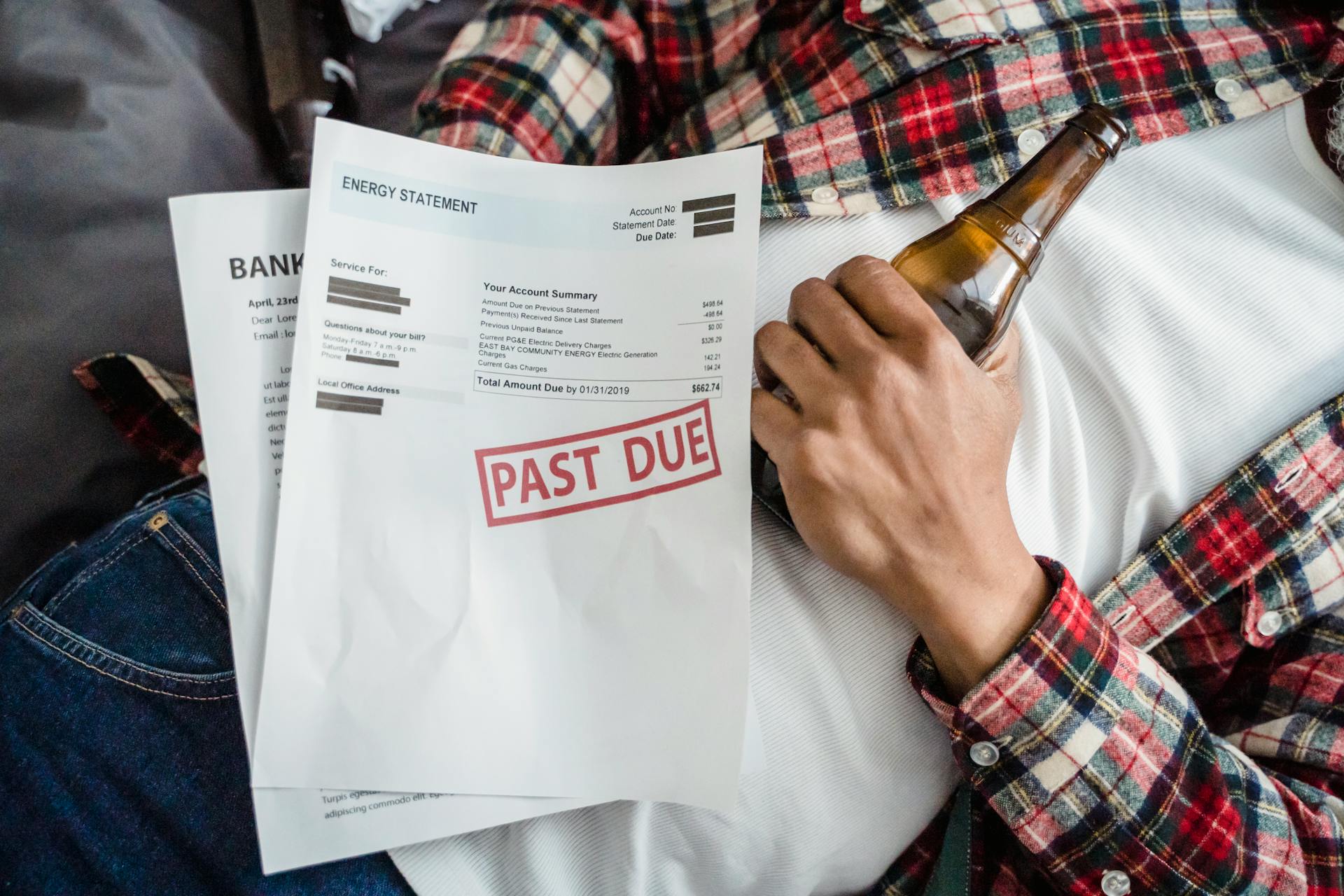
Debt collection agencies can be intimidating, but it's essential to know what to expect and how to respond.
Debt collection agencies are regulated by the Fair Debt Collection Practices Act (FDCPA), which prohibits harassment and abuse.
You have the right to dispute a debt and request validation from the debt collector.
Debt collectors typically send letters or make phone calls to collect a debt, but they must follow specific rules to avoid harassment.
If you're contacted by a debt collector, stay calm and polite, and ask for their name, the name of the company, and a written summary of the debt.
You can also request that the debt collector contact you in writing, which can help prevent misunderstandings.
Keep a record of all interactions with the debt collector, including dates, times, and details of conversations.
For another approach, see: Attorney for Bill Collector Harassment
Debt Collection Process
A collection agency can sue you for the debt you owe, which can lead to a court order to take money from your bank accounts or your paychecks.
If a debt collector wins a lawsuit, they can garnish your wages and bank accounts, but only after obtaining a court judgment. Different states have different statutes of limitations on how old a debt can be before it becomes "time-barred", freeing the debtor from responsibility to repay it.
Debt collectors typically try to contact delinquent borrowers through phone calls and letters to persuade them to pay what they owe. They can conduct searches for a debtor's assets, such as bank and brokerage accounts, to determine their ability to repay.
A debt collector has to rely on the debtor to pay and cannot seize a paycheck or reach into a bank account without a court judgment. A court judgment allows a collector to begin the process of garnishing wages and bank accounts.
Debt collectors may also contact delinquent borrowers who already have judgments against them. It can be challenging to collect money even with a court judgment, so they may try other methods like placing levies on bank accounts or motor vehicles.
Take a look at this: Judgment Collection Attorney Colorado
Understanding Debt Collection
Debt collection agencies work on behalf of creditors to collect debts, but there are different types of parties involved in the process.
A third-party debt collector attempts to collect a debt on behalf of the creditor, while a debt buyer purchases the right to collect a debt from the original creditor and tries to collect it for themselves. Recent cases have found that debt buyers qualify as debt collectors under federal law.
The law covers different parties in different ways, so it's essential to understand who's who. An original creditor is the person or entity to whom you owe money, while a debt collector is someone who tries to collect the debt on their behalf.
If you're dealing with a debt collector, you'll likely receive a debt validation letter within 5 days of the initial contact. This letter will provide information about the debt, including the amount owed and the creditor's name.
For more insights, see: Receiving Payments Online
You have 30 days to dispute the debt or request further information from the debt collection agency. If you believe you don't actually owe the debt, you should explain the situation as quickly as possible and provide documentation.
Debt collectors can sue you for the debt you owe, and if they win, they can get a court order to take money from your bank accounts or your paychecks.
Here are some key facts to keep in mind:
- An original creditor is the person or entity to whom you owe money.
- A debt collector is someone who tries to collect the debt on behalf of the creditor.
- You have 30 days to dispute the debt or request further information from the debt collection agency.
- Debt collectors can sue you for the debt you owe.
It's essential to be careful about the information you provide to debt collectors, especially if you believe the debt is not valid or has passed the statute of limitations. If you verbally agree to make a payment on time-barred debt, you may revive the debt and make it collectible again.
Regulations and Laws
Debt collection agencies are governed by strict regulations and laws to protect consumers from harassment and unfair debt collection practices. The Fair Debt Collection Practices Act (FDCPA) is comprehensive legislation that applies to the consumer debt collection industry.
Consider reading: Fair Debt Collection Practices Act Attorneys Fees
The FDCPA prohibits debt collectors from communicating with most third parties, allows consumers to request that debt collectors cease communication, and prohibits certain practices, including harassment or abuse, false or misleading representations, and other unfair or deceptive practices.
If you suspect a debt collector of FDCPA violations, you can submit a consumer complaint to the Federal Trade Commission, which is responsible for enforcing consumer protection laws and regulating a wide range of industries.
Debt collectors are bound by the FDCPA, which means they can't do certain things, such as proceed to collect an old debt that has been charged off as "uncollectible" or legally seize assets from a debtor unless they've won a lawsuit.
A debt collector may not contact an individual at work if they've explicitly stated that their employer doesn't approve of such calls, and they can't contact you more than seven times during a seven-day period.
On the other hand, debt collectors can attempt to collect a debt on which the statute of limitations has run out in some states, and they can call an individual between 8 a.m. and 9 p.m. only.
Here are some key rules that debt collectors must follow:
- May not proceed to collect an old debt that has been charged off as "uncollectible"
- May not legally seize assets from a debtor unless they've won a lawsuit
- May not physically harm or threaten to harm a debtor in an attempt to extract a payment
- May not contact an individual at work if they've explicitly stated that their employer doesn't approve of such calls
- May not contact you more than seven times during a seven-day period
The statute of limitations on debt varies by state and is often from three to five years, but even after the statute of limitations has expired, you still owe the debt and the debt collector can continue to try to collect it by other means.
Debt Collection Methods
A debt collection agency can sue you for the debt you owe, and if they win, they can get a court order to take money from your bank accounts or your paychecks.
Debt collectors can try to contact you through phone calls and letters, and they may also conduct searches for your assets to determine your ability to repay.
They cannot seize a paycheck or reach into a bank account, even if they know the routing and account numbers, unless they have obtained a court judgment ordering you to pay.
What Do Collectors Do?
Debt collectors work in similar ways, whether they're working for another creditor or for themselves. They attempt to contact delinquent borrowers through phone calls and letters to persuade them to pay what they owe.
Debt collectors can conduct searches for a debtor's assets, such as bank and brokerage accounts, to determine their ability to repay. They can't seize a paycheck or reach into a bank account, even if the routing and account numbers are known, unless they've obtained a court judgment ordering the debtor to pay.
To get a court judgment, a debt collector must sue the debtor before the statute of limitations runs out and win a judgment against them. Different states have different statutes of limitations on how old a debt can be before it becomes "time-barred."
A court judgment allows a collector to begin the process of garnishing wages and bank accounts, but they must work through the debtor's employer or bank to obtain the money.
Broaden your view: Judgment Collection
Judgment
A judgment is a court order that says the debtor owes the creditor money. If the plaintiff wins the case, either through default judgment or trial, they can start the process of collecting the money owed.
The creditor can use the judgment to garnish wages and bank accounts, but they must work through the debtor's employer or bank to obtain the money. This is only possible if the creditor has obtained a court judgment ordering the debtor to pay.
For another approach, see: Sell Judgment to Collection Agency
A court judgment allows a collector to begin the process of garnishing wages and bank accounts, but the collector must still work through the debtor's employer or bank to obtain the money. This is a crucial step in the debt collection process.
If the creditor is successful in collecting the money, they can then file papers with the court to ask that the judgment be declared satisfied. This is called a Satisfaction of Judgment.
Expand your knowledge: Send Money Now Pay Later
Consequences of Non-Payment
A low credit score can affect a person's chances of obtaining a loan in the future, as an account in collections can remain on their credit report for seven years.
Collection agencies will deploy multiple strategies to try to retrieve funds, including calling your personal and office telephones, mailing numerous late-payment notices, contacting your family, friends, and neighbors, and even appearing at your front door.
If a collection agency has a court order against you, you could be arrested if you don't comply. Failing to provide financial information or testify as required could also lead to a warrant for your arrest.
Here are some common tactics collection agencies use to collect debts:
- Calling your personal and office telephones
- Mailing numerous late-payment notices
- Contacting your family, friends, and neighbors
- Appearing at your front door
Debt Collection Agencies
Debt collection agencies are companies that try to collect debts from individuals or businesses. They can be hired by creditors or work on their own behalf.
A debt collection agency can attempt to collect debts that are 60-90 days or more past due. They may contact you through phone calls and letters to persuade you to pay what you owe.
Reputable debt collection agencies abide by the Fair Debt Collection Practices Act (FDCPA) when contacting you. This means they can't do things like threaten to harm you or contact you more than seven times in a seven-day period.
Debt collectors work in similar ways, whether they're working for another creditor or for themselves. They'll try to contact delinquent borrowers through phone calls and letters to persuade them to pay what they owe.
A debt collector can't seize your paycheck or reach into your bank account unless they've obtained a court judgment ordering you to pay. To do this, they must sue you before the statute of limitations runs out and win a judgment against you.
You might enjoy: Letters of Credit
Debt collection agencies can be hired by creditors to collect debts they're owed but have been unable to collect through their own efforts. They may collect debts like credit card accounts, medical bills, and unpaid utility bills.
Some debt collection agencies will negotiate settlements with borrowers for less than the amount owed. They may also refer cases to lawyers who file lawsuits against debtors who have refused to pay.
A debt collection agency is a company that attempts to collect delinquent debts from individuals or businesses, either on behalf of the original creditor or on its own.
Recommended read: Why Credit Card Debts Are Called Unsecured Debt
Frequently Asked Questions
How much does it cost to hire a debt collection agency?
Debt collection agency fees typically range from 20% to 40% of the debt amount, influenced by factors like debt age and balance
What happens if you never pay collections?
If you never pay collections, you'll face escalating collection efforts and a damaged credit score, potentially leading to a lawsuit. Ignoring debt collections can have serious consequences, making it essential to understand your options for resolving the debt.
What does a collection agency do to your credit?
A collection agency can negatively impact your credit by reporting a collection account, which stays on your credit report for up to 7 years from the original delinquency date. This can lower your credit score and affect your ability to get credit in the future.
What is the 7 day rule for collections?
The 7-day rule for collections limits debt collectors to making no more than 7 calls within a 7-day period regarding a specific debt. This rule aims to prevent harassment and protect consumers from excessive contact.
What is a collection agency payment?
A collection agency payment is the amount owed to a lender after a collection agency has taken over a past-due credit account balance. This payment is typically made to the collection agency to settle the debt and resolve the outstanding balance.
Sources
- https://guides.sll.texas.gov/debt-collection
- https://www.lendingtree.com/debt-consolidation/debt-collection-agency/
- https://www.utcourts.gov/en/self-help/case-categories/consumer/debt-collection.html
- https://www.investopedia.com/terms/c/collectionagency.asp
- https://www.investopedia.com/articles/personal-finance/121514/how-debt-collection-agency-business-works.asp
Featured Images: pexels.com


